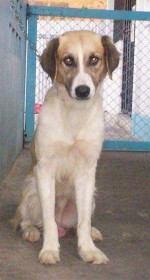We had defined gastritis as an irritation/inflammation of the stomach mucosa (internal lining). And whereas the acute gastritis is sudden, the chronic gastritis is more insidious and the ailment more protracted in nature and often associated with specific diseases.
Causes of CG
The continuous administration of certain drugs, especially painkillers (aspirin is a noted culprit in this regard) could result in a chronic gastritis. In fact, any mildly caustic substance given to the dog over a relatively long period could create lesions on the stomach wall. Indeed, the longer this condition continues, the size and depth of the gastric glands are reduced and the lining (mucous membrane) becomes even thinner.
Actually, many of the causes related to an acute gastritis situation are also valid for chronic gastritis. Indeed, many a chronic gastritis ailment would have had its origin in the acute (sudden onset) gastritis condition (see last week), which was not treated and which evolved into the more long-lasting sickness.

In addition, there can be an insidious ingestion of poisons such as arsenic, mercury (quicksilver), lead, thallium and others. One hardly notices the ailment and, since the vomiting is not continuous during the day or after every feeding, the situation is not considered serious.
It is known that increased histamine (the substance produced during an allergy attack or in association with certain tumours) may result in a type of chronic gastritis. There is also another substance known as gastrin (which is produced at a higher than normal level in dogs suffering from kidney malfunction) that is involved in the development of chronic gastritis and later in a possible stomach ulcer formation.
In my own experience here in Guyana, it seems that a chronic gastritis is mostly associated with the continuous feeding of non-nutritious ‘scraps,’ ie, poor quality food or even spoiled food. Pet owners, on being asked what they feed their animals, answer that they feed that which they themselves eat. Well, that is wrong on two main counts. Firstly we eat a lot spiced food (curries, soya sauce, ‘aji’ – MSG) which is not necessarily good for the pet. Secondly, most people eat the meat (protein) from the bone. What is offered to the dog/cat is the non-nutritious scraps devoid of meat, and which is truly deficient in valuable nutritional substance.
Finally, there is a whole host of miscellaneous substances, the ingestion of which can result in a chronic gastritis. The swallowing of hair (especially if the animal has fleas and bites at its own skin), the perverted eating of paper or plastics, or cloth or rubber items, or even grass, can precipitate a chronic gastritis condition.
Symptoms
Most, if not all gastritis cases are accompanied by vomiting at the inception. Dogs with chronic gastritis do also vomit, but not continuously (as is more the case with acute gastritis); rather, the vomiting episodes are more sporadic. Also, the animal may not always vomit after ingesting food (as is the case with acute gastritis).
Other symptoms would include a perpetual aversion to food (loss of appetite). As a result, the coat (healthy hair) might lose its lustre and become dull and coarse. Since the ailment is protracted, the animal visibly loses weight over time and becomes listless. Later, as the animal’s condition worsens, severe depression and abdominal pain are evident. Animals may exhibit excessive thirst. I have seen animals with a chronic gastritis exhibit a depraved appetite (licking concrete and eating dirt). Pain may be manifest by restlessness and objection to palpation of the abdomen. Animals may assume a crouched position or stretch out on a cool surface. When the gastritis is severe, there often is an accompanying enteritis and diarrhoea.
If the chronic gastritis continues untreated, stomach ulcers and even a perforation of the stomach wall could be the sequel. These eventualities represent a whole different problem which will be dealt with later.
Treatment
The treatment given to animals with chronic gastritis would more or less be the same as described in last week’s article. If the animal has some other major problem (eg, kidney disease), that initial malady would first have to be addressed. If a hair ball has developed in the stomach, your vet might have to use other radical methods to remove it (eg, surgery). Lots of clients ask me about the nutritional regime which must accompany the other therapeutic interventions. Last week I had mentioned some of the elements associated with gastritis treatment. In addition to what was mentioned last week relative to the diet, please note the following:
After the first 24 hours, small amounts of water may be given, followed by unseasoned (no spices) broth, soup, or boiled milk. The following day, a bland diet consisting of powdered milk, oatmeal, soft-boiled eggs, cooked rice, and milk puddings can be instituted. This diet should be fed in small amounts 3 or 4 times daily and gradually modified until the animal returns to a normal diet.
Enjoy your Easter Monday!
Please implement disease preventative measures (vaccinations, routine dewormings, monthly anti-heartworm medication, etc) and adopt-a-pet from the GSPCA’s Animal Clinic and Shelter at Robb Street and Orange Walk, if you have the wherewithal to care well for the animals. Do not stray your unwanted pets, take them to the GSPCA’s Clinic and Shelter instead. If you do not wish your pet to have puppies or kittens, you may exploit the GSPCA’s free spay and neutering programme. If you see anyone being cruel to an animal, or if you need any technical information, please get in touch with the Clinic and Shelter by calling 226-4237.





